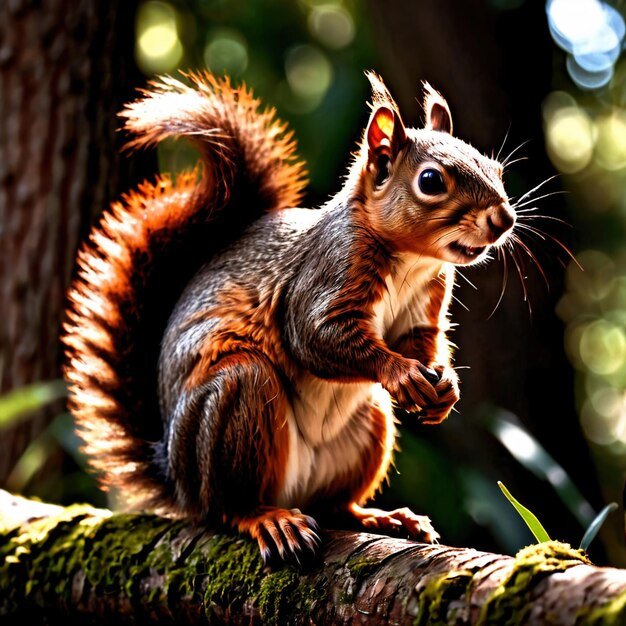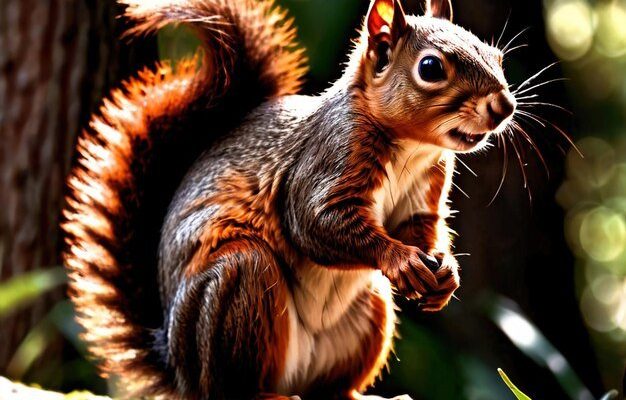
Squirrels, with their bushy tails and insatiable curiosity, contribute to the health of their habitats in several fascinating ways. They help with seed dispersal, create habitats for other animals, and even influence plant populations. It’s almost like they’re unwittingly part of a larger team working hard to keep our ecosystems balanced. So, grab a cup of coffee, and let’s dive deep into the squirrel’s world and its critical contributions to our environment.
Understanding Squirrel Species
When we talk about squirrels, it’s important to note there are over 200 species globally. The most common types are tree squirrels, ground squirrels, and flying squirrels. Each of these species has adapted to its surroundings in unique ways.
Tree squirrels, for instance, are the acrobats of the squirrel family. They are known for their agility, zipping between tree branches and raiding bird feeders. Ground squirrels, on the other hand, prefer to live underground and often live in large colonies, contributing to the soil’s aeration with their burrowing habits. Flying squirrels might not truly fly, but they have a special membrane that allows them to glide from tree to tree, making them important nighttime pollinators.
Each species has its niche. Whether it’s the lively tree squirrels making their homes in residential areas or the ground squirrels digging tunnels in grasslands, every type plays a part in the broader ecosystem. This diversity is crucial for maintaining balance, as different species contribute in various ways.
Seed Dispersal and Plant Growth
One of the most significant roles squirrels play is in seed dispersal. These little furballs have a natural instinct to gather and hide nuts and seeds in the ground for later consumption. However, they don’t always remember where they buried everyone. This forgetfulness leads to new plants sprouting in unexpected places!
So, how does this help the ecosystem? When squirrels bury seeds, they inadvertently facilitate the growth of various plant species. Trees, shrubs, and flowering plants thrive because of the squirrels’ foraging behavior. Without this species, many plants would struggle to reproduce and spread, leading to a less diverse environment.
You might be wondering why plant diversity matters. Well, a variety of plants supports a wider range of animals and insects, creating a robust food web. So, squirrels aren’t just cute; they’re also essential to keeping our forests vibrant and healthy.
Habitat Creation for Other Wildlife
Squirrels also have a hand in creating habitats for other creatures. When they nest in trees, they often leave behind abandoned nests that become homes for birds, insects, and other small animals. This “house hunting” behavior inadvertently leads to a thriving community of wildlife.
These nests, made of twigs and leaves, aren’t just cold, empty places. They can provide shelter and protection from predators. Plus, when leaves and twigs fall from these nests, they create a layer of organic matter on the forest floor, enriching the soil and supporting even more plant life.
Think of squirrels as builders in the eco-community. Their homes and activity help shape the landscape, providing essential habitats for various species. This interconnectedness of wildlife shows just how crucial each role is in maintaining ecological balance.
Food Sources for Predators
Another critical aspect of squirrels in the ecosystem is their role as a food source for various predators. Birds of prey, foxes, snakes, and even larger mammals depend on squirrels as part of their diet. This predator-prey relationship is a classic example of the food chain in action.
By serving as a food source, squirrels help maintain population balances among different species. If one part of the chain were to disappear, it could lead to an overpopulation of certain species and a collapse in the ecosystem.
In a way, squirrels play a vital role in keeping ecosystems healthy by being part of the cycle of life. They help sustain predator populations, which in turn influences herbivore numbers and plant growth. It’s all interconnected!
The Impact of Urban Squirrels
As cities grow and expand, squirrels have adapted remarkably well. Urban squirrels often find ample food sources, from bird feeders to garden plants. They can thrive in these environments, but their presence also alters the structure of urban ecosystems.
In many parks, urban squirrels help disperse seeds and maintain green spaces. Their activity can promote plant growth in areas where humans have disturbed the natural environment. Interestingly, urban areas might even have different squirrel species and behaviors compared to rural areas, showing their flexibility and adaptability.
However, there’s a downside. Urban squirrels might face challenges like traffic, pollution, and habitat loss. Despite these obstacles, they continue to play an essential role in the urban ecosystem. By maintaining green spaces, they help improve air quality and create a more pleasant environment for city dwellers.
Preserving Squirrel Populations
Given their ecological importance, protecting squirrel populations is vital. Habitat loss, climate change, and predation are just a few factors that threaten their survival. Conservation efforts focus on preserving their habitats and mitigating the impact of human activity.
There are simple ways we can contribute. Supporting local green spaces, planting native trees, and creating squirrel-friendly environments in our backyards can all make a difference. Even refraining from using harmful pesticides helps ensure that squirrels can thrive in their ecosystems.
By taking steps to protect these adorable creatures, we not only benefit them but also support the intricate web of life they help sustain. Remember, every little bit counts!
Squirrels are more than just playful animals we see in our backyards; they are vital players in the ecosystem. From seed dispersal and habitat creation to being a food source for predators, their contributions are significant. Without them, our natural world would be a very different place.
So, the next time you spot a squirrel, take a moment to appreciate all the hard work they’re doing, often without even realizing it. They are nature’s little helpers, keeping our ecosystems thriving and healthy. Understanding their role helps us appreciate the delicate balance of life surrounding us, and that’s something worth protecting!

